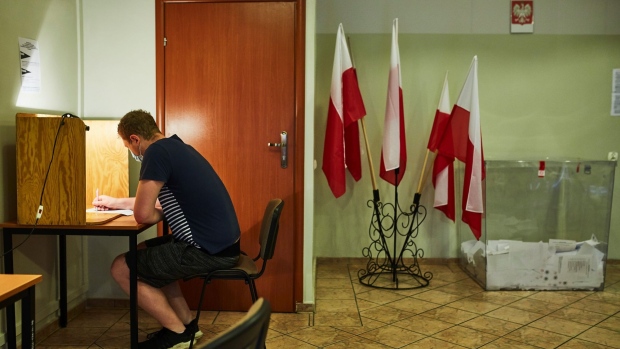Jul 12, 2020
High-Stakes Vote in Poland Tests Populist Rule
, Bloomberg News

(Bloomberg) -- Poland votes in a high-stakes presidential election as the coronavirus pandemic tests the populists’ grip on power and threatens one of the biggest nationalist makeovers in the heart of Europe.
In what may be the closest ballot in Poland’s post-communist history, incumbent Andrzej Duda is battling Warsaw Mayor Rafal Trzaskowski for the presidency in a runoff ballot on Sunday. More than 30 million eligible voters can cast their ballots until 9pm CET (3pm EST), when an exit poll will be published by the country’s three main television stations.
Duda’s presidential victory in 2015, a month before Donald Trump launched his election campaign, marked the start of a series of events that would sweep the Law & Justice party into power with its promise to kick out the “elites” and stand up to the European Union.
But in a warning sign for populists across the EU and the Atlantic, the pandemic and its economic fallout are changing the political calculus.
“The pandemic showed that simple answers by populists are lacking credibility,” said Piotr Buras, head of the Warsaw bureau of the European Council on Foreign Relations, or ECFR. “At first it seemed the pandemic would blow wind in the sails of populists, but the reality turned out to be reverse.”
Trump’s Friend
Before the outbreak, Duda was cruising for re-election, with record low unemployment and Law & Justice in control of the public narrative after winning a second term in parliamentary elections in October. After a visit to the White House, the incumbent came out on top in the first round on June 28, though without the majority needed to avoid another ballot.
In Poland, as in the U.S., the leadership has doubled down on its culture war, and Duda has the support of public broadcasters. He hurled insults at Germany, the gay community, independent journalists, took a swipe at mandatory vaccinations and promised not to give in to Jewish demands for compensation for property lost during World War II.
But the coronavirus is proving to be a game-changer. While the Polish economy is forecast to shrink the least among the European Union’s 27 countries, the crisis is making Polish citizens more skeptical of its own government and more pro EU, according to a survey by the ECFR.
That’s bad news for Law & Justice, whose government has been repeatedly sued by the EU for undermining judicial independence and the rule of law. Coal-reliant Poland is also the bloc’s only nation not to sign up for its goal of carbon neutrality by the middle of this century.
Should Trzaskowski, also 48, prevail this weekend, it would send a message to Brussels and Berlin that Poland still has one foot in the European mainstream at the critical time for the continent.
Poland’s president oversees the military, co-decides on foreign policy and can veto bills, while the prime minister -- who’s appointed by lawmakers -- runs the economy and government. Law & Justice doesn’t have a big enough majority in parliament to override a veto, meaning that Trzaskowski’s victory could halt the party’s makeover.
‘Enough’
Trzaskowski has tapped into voter anger with his “We’ve had enough” slogan. For the first time in years, Law & Justice’s message wavered.
When Law & Justice leader Jaroslaw Kaczynski visited a family grave during the brunt of the lockdown in April, at a time Poles were barred from non-essential travel, a satirical song titled “Your Pain Is Better Than Mine” topped local charts. Public radio accused the disc jockey running the countdown of manipulation, and he quit in protest.
As the election race tightened, state-controlled media has painted the president as the savior of Poland and the sole guarantor of social benefits. At the same time, Trzaskowski was depicted as close to “foreign financial circles” and eager to sell out to the Germans, Jewish groups and “radical” LGBT activists.
Election monitors at the OSCE, a multinational pro-democracy and human rights group, said the state broadcaster “failed in its legal duty to provide balanced and impartial coverage,” while its reports played on xenophobic and anti-Semitic themes.
“It’s a shame that this hostility is entering the mainstream,” said Rafal Pankowski, a sociology professor and co-founder of the “Never Again” Association that fights racism. “In the heart of Europe, in the 21st century, we have an election campaign that focuses so much on attacking and humiliating minorities.”
©2020 Bloomberg L.P.






